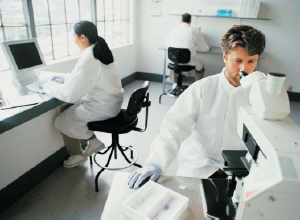Blood Testing: What It All Means
Many technologies that help humans live longer, healthier lives are available to your pet. By performing some basic blood tests, your veterinarian can gather information concerning the health and well being of your pet.
Complete Blood Count
This blood test actually consists of several tests that evaluate the number and type of blood cells in the circulation. Cells that are evaluated consist of white blood cells (WBC), red blood cells (RBC) and platelets. White blood cells are important in helping the body fight infection. Red blood cells are fundamental for carrying oxygen to the body’s tissues. The measurement of these cells can indicate anemia, infection, leukemia, stress and inflammation. Platelets are involved in the blood clotting process and if low in number can indicate a bleeding disorder. The hematocrit (HCT) provides information pertaining to the relative number of red blood cells (RBC) in circulation. This test is used to diagnose anemia and dehydration.

Blood Chemistry
These tests survey many of the organ systems of the body in order to make sure they are working properly.
• Albumin (ALB) – Low levels indicates chronic liver or kidney disease, intestinal disease or intestinal parasites (hookworm).
• Alanine Aminotransferase (ALT) – Elevated with liver disease or injury.
• Alkaline Phosphatase (ALKP) – Elevated levels can indicate liver disease or Cushing’s disease.
• Amylase (AMYL) – Elevated blood levels can indicate pancreatic and/or kidney disease.
• Blood Urea Nitrogen (BUN) – Reflects kidney and liver disease as well as dehydration.
• Cholesterol (CHOL) – Elevated levels are seen in many disorders. Some include liver and kidney disease and hypothroidism.
• Creatinine (CREA) – Elevated levels can be due to kidney disease or urinary tract obstruction.
• Blood Glucose (GLU) – High levels can indicate diabetes. Low levels can indicate liver disease, infection or certain tumors.
• Total Bilirubin (TBIL) – Levels of Bilirubin are useful in diagnosing anemia and bile duct problems.
• Total Protein (TP) – This can detect many conditions. Some include liver, kidney and gasrointestinal diseases as well as dehydration.
Blood Electrolytes
• Calcium (Ca) – Increased levels are seen with certain tumors and kidney and parathyroiud gland disease.
• Phosphorus (PHOS) – Elevated levels can indicate kidney disease.
• Sodium, Potassium, Chloride – All should be within normal levels. Vomiting, dehydration and diarrhea can affect their levels.